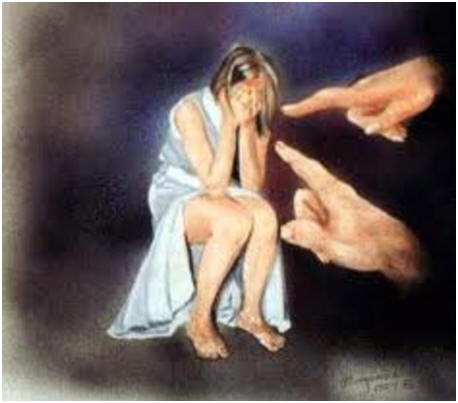"Let the sinless one among you cast the first stone
Analysis of an important Gospel phrase

By Maria Skambardoni, Student of Theology, Journalist.
|
The words “Let the sinless one among you cast the first stone” is one of
the most familiar phrases in the Holy Bible and the Lord's teaching in
the Gospel of John (John 8:7) and it concerns the woman that the locals
had demanded be stoned to death, having been accused of adultery.
It is a phrase that is widely used to highlight the fact that none of us
has the moral perfection to condemn others. It is also a phrase that
receives criticism for various reasons.
The specific incident concerns an adulterous woman that certain
representatives of the law had arrested and had wanted to be stoned to
death publically, because she was “caught red-handed” in the act of
adultery. They had responded with the Law of Moses, which stipulated
that adultery was punishable by death. As He quoted this Law
before the .....indignant crowd, Christ was seen looking down and
casually writing something on the ground with His finger, making all of
the woman's accusers mutely slink off, on hearing those words - no
longer daring to throw any stone at her. Christ then forgave the
adulteress and advised her “never to sin again.”
Many regard this phrase as equating a misdemeanor with a tiny mistake.
By using this phrase, we feel supposedly exempt of all criticism for all
bad deeds. However, this equates a crime with a tiny mistake. But “the
transgressor of one commandment becomes the transgressor of the entire
Law”, says the Apostle James (Chapter 2:10-11).
Others say that in essence, Christ did not express a vertical, negative
opinion on the practice of stoning; that on the contrary, He rendered it
an acceptable act - but only by a sinless person - without categorically
disapproving it for every single case.
When standing before the adulteress and averting her stoning, Christ did
not intend to overrule legislation that punishes and condemns crimes and
abominations.
When Christ said: “Let the sinless one among you cast the first stone”
He was inviting us to look deep within ourselves and realize that
none of us is completely and perfectly moral to condemn others.
He was motivating us to delve
into our inner world and perform our own self-criticism about our own
mistakes, omissions, imperfections, etc.. Recall all the times we've
been forgiven even though we had wronged someone and fallen into
mistakes, and the moment we too had wanted to “stone someone” for
something bad they had done. Well, surely we wouldn't want to throw a
stone at our self or be stoned for something bad that we did… Obviously
this Gospel lesson is a prompt for self-criticism, awareness and a
desire for catharsis (soul-cleansing).
Being the Creator of the World and of Life, according to the teaching of
the Christian faith, the only sinless one - Christ - had every ('legal') right to “cast the first
stone” at that woman. And yet, albeit absolutely sinless, He chose
forgiveness, thus setting a moral example for every imperfect human
being.
He did not relate stoning to an act befitting a sinless person; He
rejected it and instead promoted forgiveness, love, tolerance, and the
hope of the other's change.
If He who is perfect and sinless does not cast a stone at us, how much
more should we not dare to?
Translation by A. N.Greek Text |